|
|
The Thunder Child: An Interview With Jean-Noel Bassior
|
Jean-Noel is a well-known journalist and author. |
|
| Jean-Noel Bassior, author of Space Patrol: Missions of Daring in the Name of Early Television, graciously agreed to an interview with The Thunder Child. Photos appear courtesy of Ms. Bassior.
Jean-Noel Bassior grew up when space travel was just a dream. Raised in the land of dreams, Hollywood, California, her love for journalism was something she would discover only after her career as a musician. A singer/guitarist who played clubs by night, she worked at a newspaper by day while caretaking a cattle ranch in Sonoma County, California. Her leap into freelance writing came in the mid-1980s and the celebrity profile soon became Bassior's creative specialty.
Her famous subjects ranged from actors to politicians to musicians and royalty. Recent assignments include Andy Rooney and Larry King. She's written for many publications, including Redbook, Parade, Woman's World and AARP The Magazine, and her work has been syndicated worldwide. |
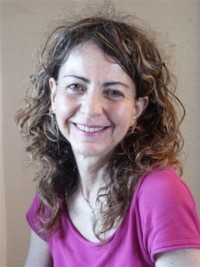
© Bob Hankins
Jean-Noel Bassior
|
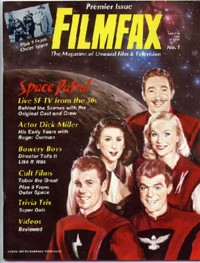
Premiere issue of FilmFax featuring a cover article by Jean-Noel Bassior. |
This interview is in two sections. This page features biographical history and general questions. The Writing of the Book page features detailed questions about her Space Patrol book.
Biography and general questions
When and where were you born?
I was born in Hollywood, California. Our apartment building was on a hill leading up to the Sunset Strip, and one of my earliest memories is peeking through curtains at a sea of lights, which was Hollywood below.
Any siblings?
One brother, Rick, and I'm really proud of him. His company is Visual Music Services, and he's a music coordinator for film and TV. His credits include Click, Double Jeopardy, The Wedding Singer, The West Wing, Poseidon, Path to War, and many others. |
| You were raised in Hollywood, California. What was it like growing up in
that city?
Amazing! For a while, I attended Hollywood High, where the talent level was off the chart. At school plays and assemblies, kids I knew would morph into polished performers -- they'd just blow me away with their singing, dancing and acting, and everyone knew there were talent scouts in the audience. At the time, my dream was to be a classical pianist, and my best friend had this incredible operatic voice. We were so Bohemian, and dressed totally in black.
Did you see a lot of stars on the streets (in addition to Lyn Osborn, of course!)?
A lot of character actors lived in our building, and my first playmates were songwriter Johnny Mercer's kids. Later on, we moved to West L.A., then to Pacific Palisades. Many of the kids in school had famous parents, but I didn't really understand - or care - who they were. Errol Flynn's daughter carried a book about her dad everywhere, even to gym class. (My maiden name began with "Fl," so she and I were always together for roll call.) Of course, I knew who her dad was, but I had no idea what kind of books Valerie Miller's father Henry wrote, or what Ann Widmark's dad did for a living. Looking back, I wish I'd paid more attention to who was who, but it didn't seem important at the time. |
Suggested Links
TTC review of Space Patrol, by Jean-Noel Bassior
Jean-Noel Bassior's website: www.spacepatrolbook.com
Jean-Noel Bassior Coaching, Writing and Speaking Services
Space Patrol website at The Solar Guard
Jean-Noel Bassior's memories of Ed Kemmer at the Space Patrol/Solar Guard site.
Links to some interviews by Bassior
Stephen Greer (Hustler Magazine)
Michael Feinstein (AARP The Magazine)
Eileen Collins (AARP The Magazine)
Old Time Radio Links
SPERDVAC
Original Old Time Radio Pages
Magazines
Big Reel
FilmFax
|
I remember Frank Sinatra, Jr., playing piano by ear in the empty band room at Emerson Junior High, after the other students had left for the day. | I remember Frank Sinatra, Jr., playing piano by ear in the empty band room at Emerson Junior High, after the other students had left for the day. It was clear he was talented. The school orchestra was interesting. Frank played timpani, and so did Jerry Lewis's son, Gary. I was a pianist, along with soon-to-be-famous Misha Dichter -- and there was a Space Patrol connection, too, in that junior high school orchestra, though I didn't know it at the time. Dave Forman played viola, and years later I learned that his father, Bill (the voice of "The Whistler" on radio), was a close friend of Lou Huston, who wrote the Space Patrol radio shows. In fact, Lou was living with the Forman family at the time I knew Dave in school. |
We moved to the Palisades when I was 13, and a lot of well-known folks lived on our street - Stallone, Ronald Reagan and others. I remember visiting a neighborhood kid one day and asking what the three gold statues in the entry hall were. She explained they were Oscars that her father, cinematographer Robert Surtees, had won. Pacific Palisades is on a cliff above the ocean, so when I wanted to get to the beach, I'd sneak through Eddie Albert's backyard because it was a great shortcut.
One of your publicity pieces said you grew up in "a difficult home." Would you mind expanding on that?
My father had a gambling problem and my mother had many problems - she disliked me, and sometimes attacked me physically. (My uncle remembers her sticking the point of a coat hanger through his hand when she was five years old, so I wasn't the only one on her enemy list.) When I was 15, I ran away from home with my best friend Terry, but the police caught up with us in St. Louis. . . Bummer. Those were the Dark Ages, when it was assumed that parents were nearly infallible and any runaway kid was a juvenile delinquent. I survived at home for another year until a police psychologist said, "Your parents are the sickest people who ever walked through my office," and found me a safer place to live.
| Years later, I realized the impact Space Patrol had on my life during that uncertain period. It modeled caring relationships between people I liked and trusted, and showed that you could go through a lot of bad stuff but not let it touch your core. I was a kid then, and TV was a powerful alternate reality. Watching Buzz, Hap, Carol, Robbie and Tonga think and fight their way out of tough situations gave me the will to survive. Buzz's quick thinking and instinctive desire to protect his cadet showed me that somewhere in the Universe there were compassionate people - heroes, in fact - who risked their lives for those close to them, held strong ideals, and wanted to do the right thing. Boy, that certainly wasn't in my world. Looking back, I came to see that maybe Space Patrol saved my life. |
Space Patrol modeled caring relationships between people I liked and trusted, and showed that you could go through a lot of bad stuff but not let it touch your core. |
Who are your favorite science fiction authors? When you were a kid, and
now.
I read everything by Heinlein, Bradbury, Asimov and Clarke, as a kid, and loved comic books (still do), but here's my guilty confession: I haven't read much SF since then. I can't wait until I win the lottery and have loads of free time to catch up on everything I've missed. Until then, I'm still back in the future with Heinlein and Bradbury.
Your initial career was as a musician. Can you describe this career
please - how it started, any successes or setbacks, etc.
I was hitchhiking around Europe and met my ex-husband, Hank, a Canadian, in Rome. He had an incredible singing voice, was a talented guitarist, and drew big crowds in Paris, street-singing. Wow, that looked good. I already played piano, so why not learn guitar and sing too? I did, and we developed a sound based on tight harmony and guitar work - I played rhythm, Hank played lead, and we called our act - can you guess? - "Hank and Jean."
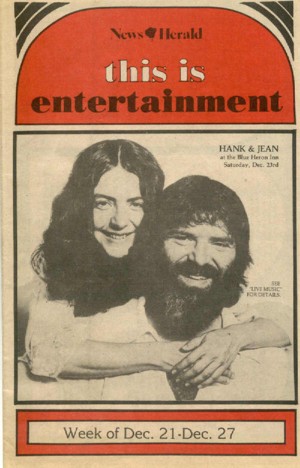 |
Back in the States, we worked restaurants and bars, got a bass player and went on the road for a chain of cocktail lounges in California. (That's something I shared with Space Patrol's Ed Kemmer - we'd both played rhythm guitar in a band.)
One day, early in our career, Hank and I were street-singing in San Francisco, when we saw Joan Baez just a few feet away - listening. Next thing we know, she's standing between us, adding three-part harmony! Her voice was so powerful - it sounded like it was coming through an invisible sound system. Of course, a huge crowd gathered - I mean, how often do you see Joan Baez street-singing? Our guitar cases filled up with tip money - we had enough to pay the rent and eat that month. It was an unbelievable experience, and it felt like a good omen as we launched our career.
You ask about setbacks. . . Well, I really admire people who survive the bar circuit and don't give up music. I stuck it out for 10 years, and I remember people coming up to me between sets, saying, "I used to be a musician." And I'd think, "Why did you quit? How could you give up playing music for a living?" But after years of singing into noise and smoke, I came to understand. When you're playing bars, you have one job: selling booze. Eventually, we got tired of the road, our marriage wasn't doing great, and after 15 years together, Hank and I split up. (Ironically, so did our idols, folk duo Ian and Sylvia.) |
I got a job caretaking a cattle ranch in Northern California, worked at a newspaper, and sang solo in clubs for a while, still wanting to be the next Linda Ronstadt. Then I reconnected with Space Patrol, and music slipped away as I focused on writing. I'll always love the sound that Hank and I created, though. It was special.
You made your "leap into freelance writing" in the mid-1980s. How
did that come about?
I have to blame Lyn Osborn, who played Space Patrol's Cadet Happy, for that. I was working in Guerneville, California, when one day, as I passed a new nostalgia store in town, I heard a "voice" urging me to go inside and ask about Space Patrol. I tell in the book how this voice, presence, or whatever-it-was, wouldn't leave me alone until I pursued the Space Patrol story. As a result, I quit my job at the newspaper and went freelance.
| During the course of tracking down the show's cast, more strange events happened, and I came to believe that the playful, persistent presence I sometimes felt at my side was Lyn Osborn. Now, I know that may seem wacky or weird, but it makes sense to me in a what-the-bleep, quantum physics kind of way. At the time all this happened, though Space Patrol had saved my life as a child by modeling rational, compassionate behavior, I hadn't thought of the show in years and had absolutely no interest in writing about early television. In fact, it took a huge cosmic smack to drag me, kicking and screaming, out of my rock star career fantasies and into writing. In the end, I'm as glad as anyone that - however it happened - the Space Patrol story got told.
Speaking of quantum and meta-physics (and my "leap into writing"), here's something else that happened early on that I didn't include in the book. . . |
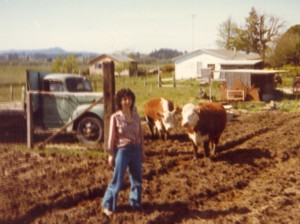
A job as caretaker of a cattle ranch in Sonoma County (California)
helped me transition from music to journalism.
|
A few months before Space Patrol came back into my life, well-known psychic Tony Cordero came to Guerneville, and I decided to have a "reading." |
A few months before Space Patrol came back into my life, well-known psychic Tony Cordero came to Guerneville, and I decided to have a "reading." The night before my session, I had dinner for the first time with Kathy, a friend of my ex-husband's. The next day, Cordero began my reading with these words: "Kathy! Kathy! Kathy!" It was the first thing he said - I still have it on tape. Of course, my mind was blown because no one else knew about that dinner -- it had been miles away from Guerneville. Cordero talked about my strong connection with Kathy, then said he saw me interviewing people with a tape recorder as part of my "writing career," and that one day I myself would be interviewed on talk shows. |
Well, I set him straight fast. What he was "seeing," I said, was not me interviewing people; it was me in a studio, cutting a demo tape, because even though I'd done some writing for local newspapers, I was really a musician. (Get it? I'm going to be the next Linda Ronstadt.) Cordero ignored this and just kept talking about how I was going to be interviewing lots of people, and how this career change was "long overdue." So when was all this going to happen, I asked, pissed off because he wasn't validating my singing career. "By this summer," he said. Turns out he was right. By April, that pesky "presence" was bugging the hell out of me, and I began tracking down the Space Patrol cast.
Your bio says that "the celebrity profile soon became Bassior's creative specialty." How do you arrange your interviews? Are you assigned them from whoever you're writing for at the time, or do you become aware of someone interesting and track them down?
I work on assignment, which means that I pitch story ideas to magazine editors, who hopefully like them and give me a go-ahead; or, sometimes a magazine asks me to do a story because they know my work and think I'm right for the job. I go after stories I'm interested in. For example, I recently profiled Larry King and Andy Rooney because they fascinate me - I've learned a lot from both of them.
Would you care to share who was your easiest interview, who was your hardest, in terms of how willingly or truthfully they answered questions.
I'm going to take the Fifth on the second part of that question because I'm still on speaking terms with most of the publicists in town, but I do have some favorites, of course. I really like Larry King - I've interviewed him four times, and feel that what you see is what you get. He doesn't put on airs or act larger than life. Tipper Gore is another favorite. She's easy to talk to, and even asked me a few questions about myself (that's rare). Ditto Mario Cuomo. Celine Dion is wonderfully honest, and her husband, Rene, set me at ease right away with his comforting presence.
I found your interview with Dr. Steven M. Greer (about the UFO cover-up) from Hustler, November,
2005. Have you had any feedback/repercussions on that from the government?
| A lot of people ask about that, and if it was safe to do it, but so far all's well and no "repercussions" (except for those clicks on my phone).
You coach writers and offer two services: "Get Published Now"; and "Book Mentoring." How does that relate to your career path? It's fun because I like teaching writers how to play the publishing game. When I started out in journalism, I didn't have someone to guide me along the way, so it felt like reinventing the wheel. These days, coaching is "in," and I like doing it between assignments. I've taught at Learning Annex, too, and give one-day seminars at UC Riverside.
I like to coach - it's exciting to brainstorm with people about books they want to write and watch their ideas come into focus. Once the concept is clear, it's crucial to have a strong query letter and book proposal, if the book is non-fiction, and I show people how to craft those. (Pitching fiction is a bit different - agents and editors may want the completed manuscript, or enough material to show you can deliver the book.)
|
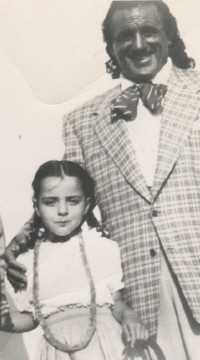
Back in the past: Here's one scared cadet with famed wrestler Baron Leoni, who was known
for "kicking people in the teeth with his heels." I was with my father
and grandfather when we met him, and they insisted on taking this
photo.
Smokin' rockets, I was terrified - even though I was watching Space
Patrol daily and should have been braver. No way!
|
Is teaching frustrating? Well, there are some people who go into resistance when they "get" how focused you have to be to submit your material. Query letters, book proposals and sample chapters require tremendous focus, and some authors discover that they really don't want to do that much work. For them, self-publishing may be the best option, though I generally say, "Why not try for a mainstream publisher? You can always self-publish if it doesn't work out." (For more info and to contact Jean-Noel see Speaker Services).
How does my coaching work relate to my career path? It's a great way to make sure my plants don't starve while my next book comes into focus. Because I have to tell you, Space Patrol hooked me on writing books. I love it and can't wait to do another one! For me, writing books offers more freedom than journalism, where your work may be heavily edited, chopped or cropped to fit a magazine's format and style. That's why you learn early on to self-edit as much as possible before submitting a story. The more you cut, the less the editor does - and the more chance you won't slam your fist through the wall when you see the published version. Writing books is different. In that arena, writers have more power: No one changes your style, and you have control over content.
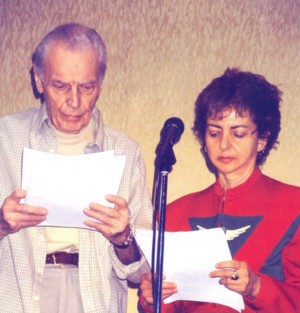
Ed Kemmer ("Buzz Corry") and Jean-Noel Bassior (playing Lyn Osborn's role of "Hap") perform a Space Patrol radio episode at the Williamsburg Film Festival, 2003.
|
At the Williamsburg Film Festival, 2003 you acted as Cadet Happy in the radio play "Water Rights," in which Space Patrol and Tom Corbett meet. How did this come about?
Playing "Cadet Happy" opposite Ed Kemmer in Jack McKirgan's brilliantly crafted "Water Rights" was a fantasy come true. The minute I saw the script - a radio drama combining Space Patrol and Tom Corbett, Space Cadet - I knew that I had to play Hap. When I first broached the idea to Ed Kemmer, I joked that I knew I was the wrong gender, but that I'd become an expert on Lyn Osborn's life and felt I knew both him and the character. At the time, I was scared. I'd starred in a high school play, but hadn't acted in decades. When Ed said it was fine with him if I played Hap, I went into Buzz Corry mode - you know, "Somehow, some way, we'll pull this off." I was relieved when, during the rehearsal, after I read Hap's first major speech, Ed tapped me on the knee - his seal of approval. On stage, when I got a laugh for those same lines, he did it again and whispered "Nice job." Smokin' rockets! It was a thrill to get to "be" Hap at last.
|
Recently we lost Frankie Thomas, who played the lead in Tom Corbett. Did you ever interview him?
I did talk to him once at length in the mid-80s, and he answered some questions by e-mail as I was doing the book. I never got to know him well, since my focus has always been Space Patrol, but we had this great talk about early TV and the impact of space opera on kids.
What struck me was his willingness to talk about Corbett - both the show and the character - as if the whole thing was yesterday. At that time, I was just getting to know Ed Kemmer, who was more guarded and didn't talk about Space Patrol unless asked, so I marveled at Frankie's eagerness to relive those days and don the costume at every opportunity. (Both Frankie and Ed were proud they could fit into their original costumes.) Frankie was willing to carry the mantle of childhood hero, and I realize now that I felt good every time I saw him wearing that cadet uniform - he kept so many good memories alive.
You've been attending various conventions over the years and are going
to be at the LA Con in August. Have you served on panels with any
interesting people? Had any interesting questions asked from audience
members?
Actually, I've been to only one other convention besides Williamsburg. It was hosted by SPERDVAC (Society to Preserve and Encourage Radio Drama, Variety and Comedy) in the '90s, and featured a re-enactment of a Space Patrol radio show written for the occasion by Lou Huston, with Ed Kemmer playing Buzz Corry. And you're right - I did notice how interesting the questions from the audience were. When I was doing the book, I got incredible quotes from "cadets" who remembered Space Patrol, and some of them offered insightful comments about TV then and now. One of my favorites came from Rob Robinson: "I wonder if forty years from now the kids of today will look back fondly on their violent video games and electronic mass killings."
What interviews or articles are you working on right now?
I'm pitching some ideas to magazines, and just got back from the East Coast, where I met with some book editors interested in turning a magazine story I co-wrote for AARP The Magazine into a book. Too early to say much at this point, but I do know this: After doing the Space Patrol book, I'm hooked: I want to do more books!
Please continue to: The Writing of the Book.
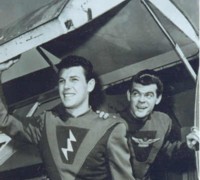
|
Must Have!

Learn more or
Buy Now
Recommended Viewing

Learn more or
Buy Now

Learn more or
Buy Now

Learn more or
Buy Now
Recommended Listening

Learn more or
Buy Now

Learn more or
Buy Now
Recommended Reading

Learn more or
Buy Now

Learn more or
Buy Now

Learn more or
Buy Now

Learn more or
Buy Now

Learn more or
Buy Now

Learn more or
Buy Now
|
















